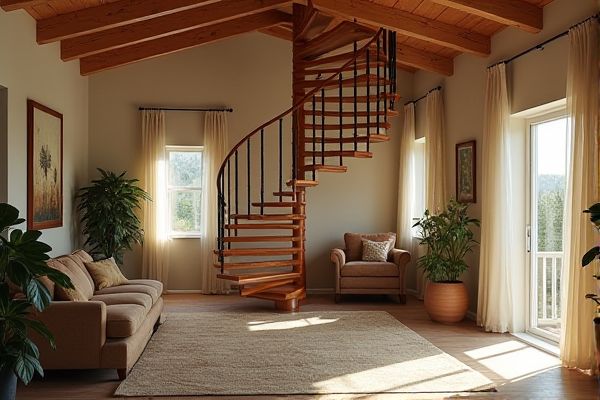
Choosing between a spiral kit and a custom spiral depends on your budget, design preferences, and installation skills; spiral kits offer affordability and ease of assembly, while custom spirals provide personalized designs tailored to your space. Discover which option best suits Your project by exploring the detailed comparison in the rest of this article.
Table of Comparison
| Feature | Spiral Kit | Custom Spiral |
|---|---|---|
| Design | Pre-designed templates | Tailored to specific requirements |
| Cost | Lower cost, budget-friendly | Higher cost, premium pricing |
| Installation | Quick and easy assembly | Professional installation needed |
| Customization | Limited options | Fully customizable |
| Materials | Standard materials | High-quality, choice of materials |
| Lead Time | Immediate availability | Longer production time |
| Durability | Moderate durability | High durability and strength |
| Use Case | Small projects, DIY | Large projects, specific needs |
Introduction to Spiral Kits and Custom Spirals
Spiral kits offer a convenient, pre-packaged solution for creating precise spiral structures, often used in crafting, mechanical, or architectural applications, featuring standardized components for easy assembly. Custom spirals, on the other hand, are tailored designs crafted to meet specific requirements, allowing for unique dimensions, materials, and functionalities that standard kits cannot provide. Both options serve distinct purposes, with spiral kits prioritizing efficiency and uniformity, while custom spirals emphasize flexibility and bespoke engineering.
Key Differences Between Spiral Kits and Custom Spirals
Spiral kits offer pre-designed, standardized components for spiral staircases, enabling quicker installation and cost efficiency, while custom spirals are tailored to specific architectural requirements, providing unique designs and precise fit. Spiral kits often utilize modular parts with fixed dimensions, whereas custom spirals allow for flexible materials, dimensions, and aesthetic details to match individual preferences. The choice between spiral kits and custom spirals impacts project budget, timeline, and design customization level.
Advantages of Choosing Spiral Kits
Spiral kits offer a cost-effective and time-saving solution for creating spiral staircases, featuring pre-measured and pre-cut components designed for easy assembly and installation. These kits provide standardized quality and safety compliance, reducing the risk of errors often encountered with custom spirals. Ideal for DIY projects, spiral kits streamline construction while maintaining aesthetic appeal and structural integrity.
Benefits of Opting for Custom Spirals
Custom spirals offer precise diameter, pitch, and material choices tailored to specific applications, enhancing performance and durability. They accommodate unique design requirements, ensuring optimal fit and functionality in machinery or packaging systems. Investing in custom spirals reduces downtime and maintenance costs by providing superior compatibility and wear resistance.
Cost Comparison: Spiral Kits vs Custom Spirals
Spiral kits typically offer a lower cost option ranging from $20 to $100, making them ideal for budget-conscious projects requiring standard dimensions and basic materials. Custom spirals, priced between $150 and $500 or more, provide tailored solutions with specialized materials, exact sizes, and unique design features that meet specific application needs. Understanding your project's requirements can help determine whether the affordability of spiral kits or the precision of custom spirals delivers better value.
Installation Process: Kit vs Custom Solutions
Spiral kits offer a streamlined installation process with pre-measured components designed for easy assembly and minimal on-site adjustments, reducing labor time and costs. Custom spiral solutions require precise measurements and tailored fabrication, leading to more complex installation steps that often demand specialized tools and expert installers. While kits provide standardized ease, custom spirals excel in adaptability to unique architectural requirements but involve longer preparation and installation phases.
Durability and Material Options
Spiral kit staircases offer robust durability with pre-engineered steel or aluminum components designed for easy assembly and long-lasting performance. Custom spiral staircases provide a broader range of material options, including hardwood, wrought iron, and glass, allowing for tailored durability based on your specific environmental and aesthetic needs. Choosing between a spiral kit and a custom spiral often depends on whether you prioritize standardized strength or personalized material versatility.
Design Flexibility and Customization
Spiral kits offer limited design flexibility with predefined components suitable for standard applications, while custom spirals provide tailored solutions to meet specific project requirements and unique spatial constraints. You gain greater control over dimensions, materials, and coil configurations with custom spirals, allowing optimal performance and aesthetic integration in your design. Choosing custom spirals ensures your system aligns precisely with functional needs and architectural vision.
Ideal Applications for Each Option
Spiral kits excel in quick prototyping and small-scale projects where standardized dimensions and materials are sufficient, making them ideal for beginners or hobbyists in crafting and binding. Custom spirals offer advanced flexibility in size, material, and coil pitch, making them perfect for professional applications such as architectural models, specialized machinery, or bespoke design projects requiring precise specifications. Choosing between spiral kits and custom spirals depends on project complexity, customization needs, and production scale.
How to Decide: Spiral Kit or Custom Spiral?
Choosing between a spiral kit and a custom spiral depends on your project's complexity, budget, and timeline. Spiral kits offer pre-designed components ideal for standard needs and quick assembly, while custom spirals provide tailored specifications for unique or intricate applications. Evaluate your design requirements and resource availability to determine which option best fits your goals.
 homyna.com
homyna.com